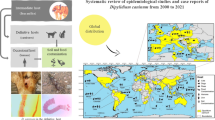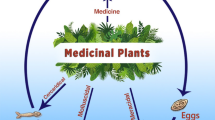Abstract
The aim of this study was to evaluate the efficacy of a topical combination of moxidectin 3.5%, imidacloprid 10% and praziquantel 10% for the prevention of Dirofilaria immitis (Leidy, 1856) infection in dogs. For this purpose, a randomized and controlled clinical trial was conducted between August 2021 and October 2022, in the municipality of Goiana, state of Pernambuco, north-eastern Brazil, where heartworm is highly prevalent. Of the 213 dogs initially sampled (baseline), 68 (31.9%) were positive for adult antigens (SNAP 4Dx Plus, Idexx) and/or microfilariae (modified Knott’s test). On day 0, 140 negative dogs were randomly included in the treatment and control groups, 70 animals each. During the study, 60 dogs (34 treated and 26 untreated) were removed for different reasons. At the end of the study (day 360 ± 2), 36 treated and 44 untreated were sampled and included in the efficacy calculation. The efficacy against the development of adults and microfilariae was 84.7%, with only one treated dog being positive for adult antigens but negative for microfilariae. On the other hand, eight untreated dogs were positive for adult antigens and/or microfilariae, resulting in a significant difference in the number of positives between groups (Chi-square test = 4.706, df = 1, P = 0.0301). Remarkably, the efficacy against the appearance of D. immitis microfilariae was 100% (i.e., all treated dogs negative) and three untreated dogs were positive for microfilariae. The topical combination of moxidectin 3.5%, imidacloprid 10% and praziquantel 10% significantly reduced the risk of D. immitis infection in treated dogs as compared with untreated dogs, in a highly endemic area in north-eastern Brazil.
Similar content being viewed by others
Data availability
All data supporting the conclusion of this study are included in the manuscript.
References
Alberigi B, de Souza CDSF, Fernandes JI, Merlo A, Labarthe N (2020) Use of slow-release injectable moxidectin for treatment of Dirofilaria immitis infection during pregnancy. Front Vet Sci 6:440
Bader J, Ramos RAN, Otranto D, Dantas-Torres F (2020) Vector-borne pathogens in dogs from Guatemala, Central America. Vet Parasitol Reg Stud Reports 22:100468
Bowman DD (2012) Heartworms, macrocyclic lactones, and the specter of resistance to prevention in the United States. Parasit Vectors 5:138
Bowman DD, Mannella C (2011) Macrocyclic lactones and Dirofilaria immitis microfilariae. Top Companion Anim Med 26:160–172
Bowman DD, Charles SD, Arther RG, Settje T (2015) Laboratory evaluation of the efficacy of 10% imidacloprid + 25% moxidectin topical solution (Advantage® Multi, Advocate®) for the treatment of Dirofilaria immitis circulating microfilariae in dogs. Parasitol Res 114(Suppl 1):S165-74
Brianti E, Napoli E, De Benedetto G, Venco L, Mendoza-Roldan JA, Basile A, Bezerra-Santos MA, Drake J, Schaper R, Otranto D (2023) Elimination of Dirofilaria immitis infection in dogs, Linosa Island, Italy, 2020–2022. Emerg Infect Dis 29(8):1559–1565
Carmichael J, McCall S, DiCosty U, Mansour A, Roycroft L (2017) Evaluation of Dirofilaria immitis antigen detection comparing heated and unheated serum in dogs with experimental heartworm infections. Parasit Vectors 10(Suppl 2):486
Dantas-Torres F, Otranto D (2020) Overview on Dirofilaria immitis in the Americas, with notes on other filarial worms infecting dogs. Vet Parasitol 282:109113
Dantas-Torres F, Figueredo LA, Sales KGDS, Miranda DEO, Alexandre JLA, da Silva YY, da Silva LG, Valle GR, Ribeiro VM, Otranto D, Deuster K, Pollmeier M, Altreuther G (2020) Prevalence and incidence of vector-borne pathogens in unprotected dogs in two Brazilian regions. Parasit Vectors 13:195
Dantas-Torres F, Ketzis J, Pérez Tort G, Mihalca AD, Baneth G, Otranto D, Watanabe M, Linh BK, Inpankaew T, Borrás P, Arumugam S, Penzhorn BL, Ybañez AP, Irwin P, Traub RJ (2023) Heartworm adulticide treatment: a tropical perspective. Parasit Vectors 16:148
European Medicines Agency (2019) Guideline on good clinical practice. VICH Topic GL9. https://www.ema.europa.eu/en/vich-gl9-good-clinical-practices. Accessed 8 Jul 2019
Figueredo LA, Sales KGDS, Deuster K, Pollmeier M, Otranto D, Dantas-Torres F (2017) Exposure to vector-borne pathogens in privately owned dogs living in different socioeconomic settings in Brazil. Vet Parasitol 243:18–23
Frangipane di Regalbono A, Di Cesare A, Traversa D, Simonato G, Poser H, Danesi P, Furnari C, Russi I, Raele DA, Crisi P, Pampurini F, Pietrobelli M (2016) Microfilaricidal efficacy of a single administration of Advocate® (Bayer Animal Health) in dogs naturally infected with Dirofilaria immitis or Dirofilaria repens. Vet Parasitol 226:30–34
Jacobs DE, Arakawa A, Courtney CH, Gemmell MA, McCall JW, Myers GH, Vanparijs O (1994) World Association for the Advancement of Veterinary Parasitology (W.A.A.V.P.) guidelines for evaluating the efficacy of anthelmintics for dogs and cats. Vet Parasitol 52(3–4):179–202
Jacobson LS, DiGangi BA (2021) An accessible alternative to melarsomine: “moxi-doxy” for treatment of adult heartworm infection in dogs. Front Vet Sci 8:702018
Kryda K, Holzmer SJ, Everett WR, McCall JW, Mahabir SP, McTier TL, Maeder SJ (2020) Preventive efficacy of four or six monthly oral doses of 24 µg/kg moxidectin compared to six monthly doses of Heartgard® Plus or Interceptor® Plus against macrocyclic lactone-resistant heartworm (Dirofilaria immitis) strains in dogs. Parasit Vectors 13:339
Labarthe N, de Campos Pereira M, Barbarini O, McKee W, Coimbra CA, Hoskins J (2003) Serologic prevalence of Dirofilaria immitis, Ehrlichia canis, and Borrelia burgdorferi infections in Brazil. Vet Ther 4(1):67–75
Labarthe NV, Paiva JP, Reifur L, Mendes-de-Almeida F, Merlo A, Carvalho Pinto CJ, Juliani PS, de Almeida MA, Alves LC (2014) Updated canine infection rates for Dirofilaria immitis in areas of Brazil previously identified as having a high incidence of heartworm-infected dogs. Parasit Vectors 7:493
Labarthe NV, Willi LMV, Paiva JP, Miranda MGN, Zoreck K, Almeida FM (2015) Chemoprophylaxis of Dirofilaria immitis (Leidy 1856) infection at a high challenge environment. Parasit Vectors 8:523
Ledesma N, Harrington L (2011) Mosquito vectors of dog heartworm in the United States: vector status and factors influencing transmission efficiency. Top Companion Anim Med 26(4):178–185
Maggi RG, Krämer F (2019) A review on the occurrence of companion vector-borne diseases in pet animals in Latin America. Parasit Vectors 12:145
Mathur S, Malpas PB, Mahabir S, Boucher J, Pullins A, Gagnon G, McTier TL, Maeder S (2023) Safety of Simparica Trio® (sarolaner, pyrantel, moxidectin) in heartworm-infected dogs. Parasit Vectors 16:119
McCall JW, Arther R, Davis W, Settje T (2014) Safety and efficacy of 10% imidacloprid +2.5% moxidectin for the treatment of Dirofilaria immitis circulating microfilariae in experimentally infected dogs. Vet Parasitol 206(1–2):86–92
McTier TL, Holzmer S, Kryda K, Mahabir S, McCall JW, Trombley J, Maeder SJ (2021) Comparative preventive efficacy of ProHeart® 12, Heartgard® Plus and Interceptor® Plus against a macrocyclic lactone-resistant strain (JYD-34) of heartworm (Dirofilaria immitis) in dogs. Parasit Vectors 14:226
Mitchell E, Tielemans E, McCall JW, Baker C, Martin E, Frost J, Yoon S, Fankhauser B (2023) Efficacy of an oral combination of moxidectin, afoxolaner, and pyrantel pamoate for the prevention of heartworm disease in dogs. Res Vet Sci 162:104957
Myers JAE, Holzmer S, McCall JW, Mahabir SP, McTier TL, Maeder SJ, Kryda K (2022) Preventive efficacy of six monthly oral doses of Simparica Trio®, Heartgard® Plus, and Interceptor® Plus against a macrocyclic lactone-resistant strain (ZoeLA) of heartworm (Dirofilaria immitis) in dogs. Parasit Vectors 15:81
Newton WL, Wright WH (1956) The occurrence of a dog filariid other than Dirofilaria immitis in the United States. J Parasitol. 42(3):246–258
Otranto D, Diniz DG, Dantas-Torres F, Casiraghi M, de Almeida IN, de Almeida LN, dos Santos JN, Furtado AP, de Almeida Sobrinho EF, Bain O (2011) Human intraocular filariasis caused by Dirofilaria sp. nematode, Brazil. Emerg Infect Dis 17(5):863–866
Otranto D, Dantas-Torres F, Fourie JJ, Lorusso V, Varloud M, Gradoni L, Drake J, Geurden T, Kaminsky R, Heckeroth AR, Schunack B, Pollmeier M, Beugnet F, Holdsworth P (2021) World Association for the Advancement of Veterinary Parasitology (W.A.A.V.P.) guidelines for studies evaluating the efficacy of parasiticides in reducing the risk of vector-borne pathogen transmission in dogs and cats. Vet Parasitol 290:109369
Panarese R, Iatta R, Beugnet F, Otranto D (2022) Incidence of Dirofilaria immitis and Leishmania infantum infections in sheltered dogs from Southern Italy. Transbound Emerg Dis 69(2):891–894
Saha BK, Bonnier A, Chong WH, Chieng H, Austin A, Hu K, Shkolnik B (2022) Human pulmonary dirofilariasis: a review for the clinicians. Am J Med Sci 363(1):11–17
Savadelis MD, McTier TL, Kryda K, Maeder SJ, Woods DJ (2022) Moxidectin: heartworm disease prevention in dogs in the face of emerging macrocyclic lactone resistance. Parasit Vectors 15:82
Simón F, Siles-Lucas M, Morchón R, González-Miguel J, Mellado I, Carretón E, Montoya-Alonso JÁ (2012) Human and animal dirofilariasis: the emergence of a zoonotic mosaic. Clin Microbiol Rev 25(3):507–544
Acknowledgements
Thanks to the field veterinarians (Moana Olimpia Gomes Freire and Carolina D’alifany) for their support with blood collection. LGS and LCSP are currently supported by the Intramural Research Program of the National Institute of Allergy and Infectious Diseases.
Funding
This project was sponsored by Labyes (project number: IAM-007-FEX-19).
Author information
Authors and Affiliations
Contributions
Study design and coordination: FDT. Data acquisition: LAF, KGSS, RLNL, LCSP, LGS and LLNB. Data analysis: FDT, DO. Manuscript writing: FDT. Manuscript revision: LAF, KGSS, RLNL, LCSP, LGS, LLNB and DO. All authors read and approved the final manuscript.
Corresponding author
Ethics declarations
Ethics approval
This project was approved by the Animal Use Ethics Committee (CEUA) of the Aggeu Magalhães Institute (Fiocruz-PE), under protocol number 154/2019.
Consent to participate
Dog owners signed an informed consent form allowing the participation of their dogs in the study.
Consent for publication
Not applicable.
Competing interests
This project was sponsored by Labyes. We declare the sponsor did not play any role in study design, conduction, data acquisition, interpretation, and manuscript preparation.
Additional information
Handling Editor: Julia Walochnik
Publisher's Note
Springer Nature remains neutral with regard to jurisdictional claims in published maps and institutional affiliations.
Rights and permissions
Springer Nature or its licensor (e.g. a society or other partner) holds exclusive rights to this article under a publishing agreement with the author(s) or other rightsholder(s); author self-archiving of the accepted manuscript version of this article is solely governed by the terms of such publishing agreement and applicable law.
About this article
Cite this article
Dantas-Torres, F., Figueredo, L.A., Sales, K.G.d. et al. Prevention of heartworm infection in dogs using a combination of moxidectin, imidacloprid and praziquantel: evidence from a randomized clinical trial. Parasitol Res 123, 94 (2024). https://doi.org/10.1007/s00436-023-08112-x
Received:
Accepted:
Published:
DOI: https://doi.org/10.1007/s00436-023-08112-x




